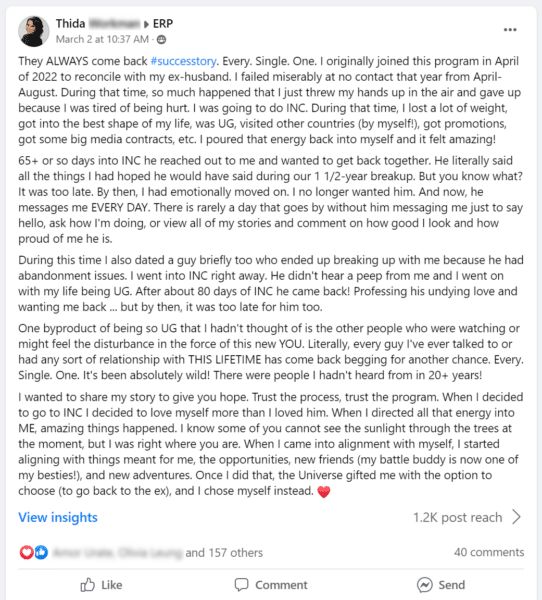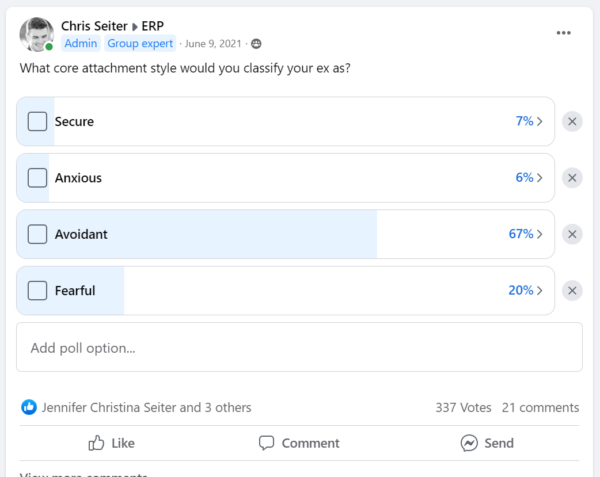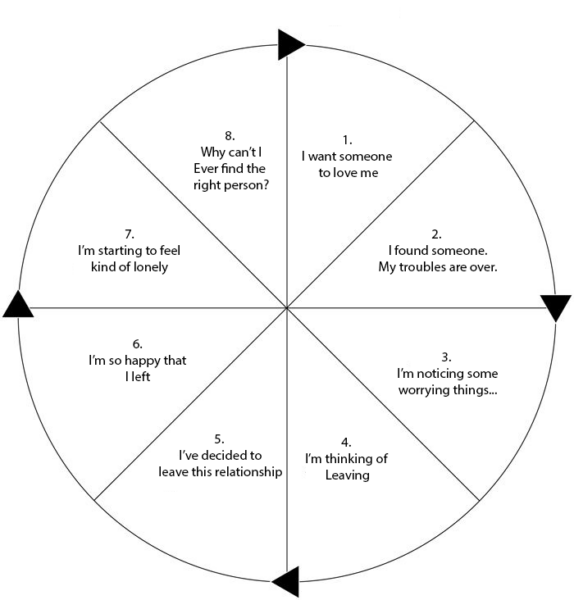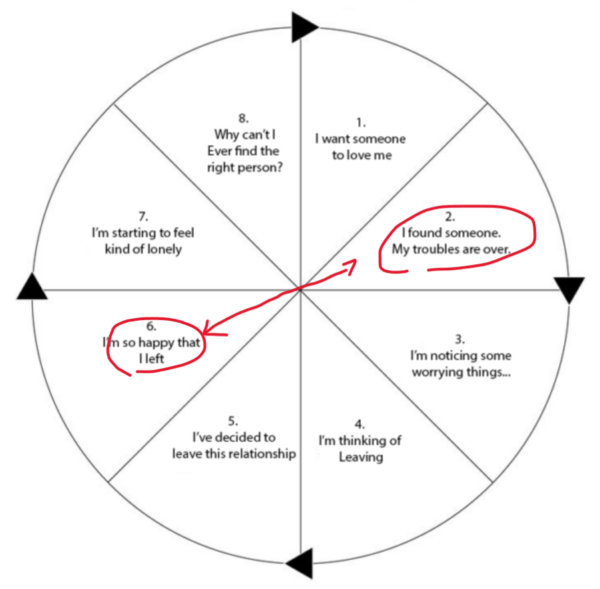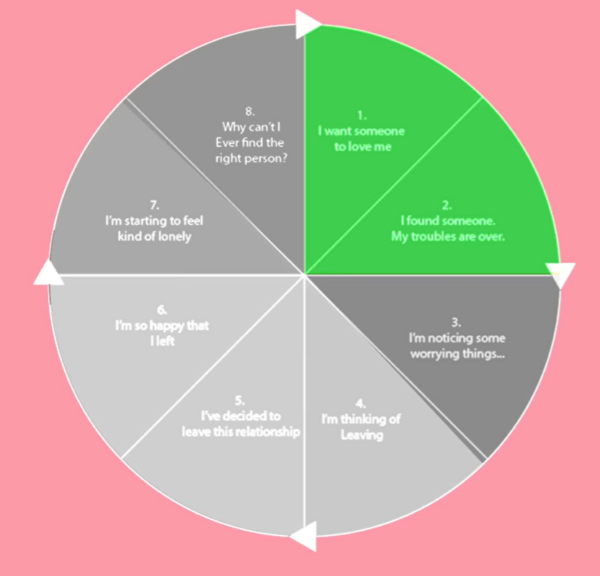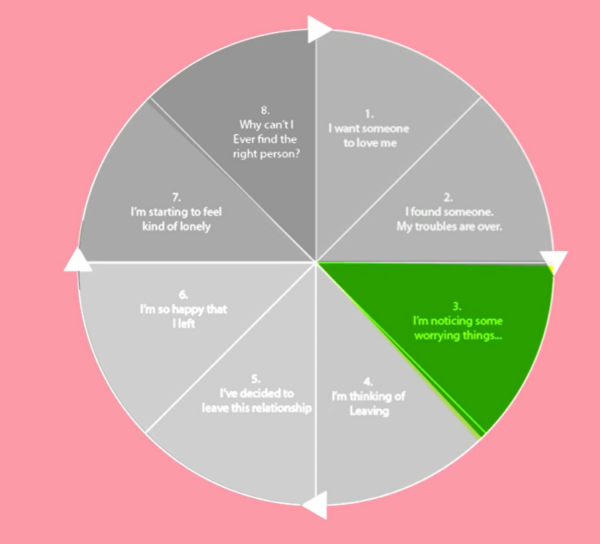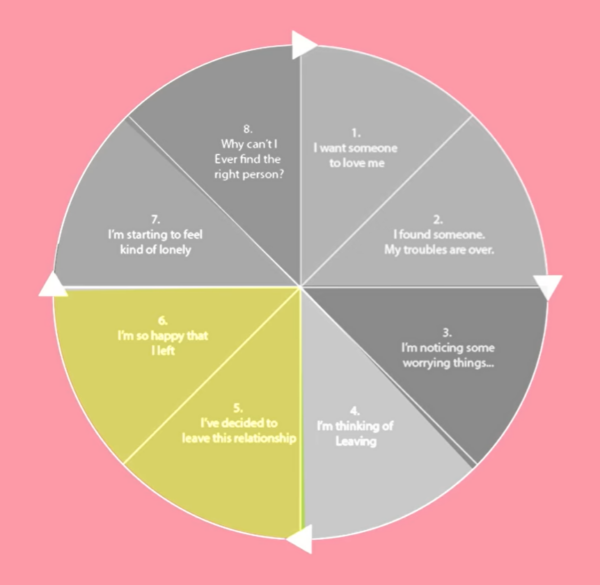I’ve been thinking a lot lately about dumpers remorse.
Specifically, if every ex who breaks up with you has it. After all, one look at this comment in our community would leave you to believe they do,
Truthfully, I think the answer is far more complicated but here’s my “bird’s eye view” thoughts.
I believe that most exes who break up with you will experience dumpers remorse if they have an avoidant attachment style. (But notice I say most, not all.)
So today we’re going to a deep dive on the following topics,
- How Common Is Dumpers Remorse?
- Is It Possible To Have Dumpers Remorse And Not Act On It?
- Situations In Which It’s Not Likely To Occur
- Initially Your Ex Won’t Experience Dumpers Remorse Immediately After The Breakup
- When It Is Likely To Occur
Let’s begin!

What Are Your Chances of Getting Your Ex Boyfriend Back?
Take the quizHow Common Is Dumpers Remorse?
You know, there’s not a lot of research out there that specifically studies Dumper’s Remorse.
So, essentially, I think the only thing that we can point to, that gives us some indication of how common it is, is by looking at the success story statistics that I’ve spent the last few years researching and studying.
But even that can be problematic because there’s not a lot of research and investment out there into breakup research, specifically on how likely it is for exes to come back.
In fact, to prove this point, a few years ago I wrote an article called “How Often Do Exes Come Back?” in which I came up with an exact percentage (Though I’d definitely put an asterisk next to the percentage because of how little reputable research is out there.)
The hard, fast rule I gave myself when I was writing this article was to take a look at reputable sources that I could find, ones that had statements about how likely exes could come back together.
And ultimately, I found four research/polls that speak to the issue.
- An Associated Press Poll
- A Study From The University of Texas
- A Study From National Library Of Medicine
- A Study From Kansas State University
Associate Press Poll: (Source)
The first one is an Associated Press poll, which stated that 41% of people have gone back to an ex at some point in their lives.
The problematic area here is that it’s not really looking at relationships or every single breakup as a whole. It’s just looking at relationships throughout the entirety of a life. Many of us, at one point, will have gone back to an ex, and in this case, the Associated Press poll stated that 41% of people had.
University Of Texas: (Source Of Professor)
The second poll is from the University of Texas, stating that 65% of people have gone back to exes. This poll was supposedly run by a professor at the University of Texas named Renee Dailey.
The problem I found with it is that when I wrote this article in 2021, the source I had cited no longer exists. So for whatever reason, it has been wiped out. But at one point, there was a study that stated that 65% of college students had gone back to their exes.
But with that one, I would take it with a massive grain of salt. Right off the bat, 65% sounds really high, but nevertheless, that’s the case.
National Library Of Medicine: (Source)

What Are Your Chances of Getting Your Ex Boyfriend Back?
Take the quizThe third study I found was from a study called “Relationship Churning in Emerging Adulthood: On and Off Relationships and Sex with an Ex.” It claimed 44% of people had gotten their exes back.
Kansas State: (Source)
And the fourth and final study is from Kansas State, which stated that 37% of people had gone back to their exes.
Averaging It Together
So overall, when you average all of those together, you’re going to get 46% of exes who have potentially gone back after a relationship, and if you connect the dots there, it’s not too far-fetched to assume that these people experienced dumper’s remorse.
Yet here’s the challenge. Those people in that study are the exes who actually acted on dumper’s remorse. Is it possible to have dumper’s remorse and not act on it?
Is It Possible To Have Dumpers Remorse And Not Act On It?
And this is where it gets really difficult to pinpoint.
Obviously, we can easily point to someone who got back with their ex and say, yes, that person had dumper’s remorse. But my research into studying the psychology of exes states that a lot of exes most likely will not act on dumper’s remorse.
So there’s a couple of things I want to look at here.
Number one is the fact that around 67% of the exes that we study have been classified as having dismissive avoidant attachment styles.
This means they really value their independence over all other things to the point where they will actually leave relationships when they feel that independence has become threatened.
But it’s actually their ability to create phantom exes that I think gives us some insight into how likely an avoidant is to have dumper’s remorse.
So I’m going to actually pull from one of my favorite avoidant research websites, a website called Free To Attach:
An avoidant person often has a story of a perfect ex in a relationship that wasn’t fully realized, the one that got away, to whom no one else can measure up. In reality, the idealized relationship was often lackluster or insecure and unlikely to be highly functional. For example, it may have ended prematurely, where there wasn’t time to learn someone’s flaws because they were dumped, or with a frequently unavailable or disinterested partner. Their needs and feelings were often unexpressed openly, with feelings of desire stemming from the insecurity of not knowing how the other felt, or little real demonstration or expression of commitment. This person becomes a very likely candidate for a phantom ex.
But I would go on and argue that the phantom ex operates because there is distance, not because the relationship was successful.
Most of the time, someone who has an avoidant attachment style will paint their ex as a phantom ex because this is the ideal relationship for them.
They like to feel all the warm, fuzzy feelings for someone without the threat of a commitment. So they get to have their cake and eat it too. They get to fawn over you from afar, potentially have dumper’s remorse, but they don’t have to have the threat of their independence being threatened.
And I think this insight into phantom exes teaches us a lot about dumper’s remorse.
It is entirely possible that you can have an ex that has dumper’s remorse but decides to paint you as the phantom ex as opposed to actually acting on it. So ultimately, I believe that dumper’s remorse is very common.
I’m hesitant to put an exact percentage on how often exes have dumper’s remorse because quite frankly, I don’t know. There’s not enough research out there on that.
But I would say it is more exes than not that have this dumper’s remorse.
Here Are The Situations Where Dumpers Remorse Is Not Likely To Occur
Of course, there are some situations in which dumper’s remorse is not likely to occur.

What Are Your Chances of Getting Your Ex Boyfriend Back?
Take the quiz- You cheated
- A lot of time has gone by for them
- They have moved on to someone else and been with that person for more than 6 months
Let’s take it from the top.
You Cheated
One of those situations would be if you potentially cheated on them.
It’s not likely that you will be a phantom ex or be fawned over if you cheated on them because this will probably reinforce their avoidant identity that relationships are painful, people betray them, and that this is why they should never let anyone in.
They’re likely not going to have dumper’s remorse in that particular situation.
A Lot Of Time Has Gone By
Another situation is if a lot of time has gone by for them, and I’m not talking about six months; I’m talking about six years, ten years, fifteen years. Enough time has gone by to where they’ve gotten over the breakup completely.
There’s a lot of conflicting research out there on how long it takes to get over a breakup.
I would actually make the argument that we’re not necessarily looking for a fringe possibility here.
We’re looking for something where definitively enough time has gone by that they shouldn’t still be hung up on their ex. In this particular case, no, that ex is not going to have dumper’s remorse.
The Rebound Is No Longer A Rebound
I also think a situation in which dumper’s remorse is not likely to occur is if they’ve moved on to someone else and they’ve been with that person for more than six months.
Now I chose six months specifically because we find that this is usually the transitioning period when a new relationship turns from a rebound into an actual, non-rebound type relationship that’s a little bit more serious by nature.
This is the one situation I think is most at risk of them not having dumper’s remorse.
But there are a lot of statistics out there that prove that dumper’s remorse is very common. Many of these situations that we’re talking about are rarer by nature.
Let’s actually switch gears for a moment here and talk about what it’s like for someone who has dumper’s remorse when it occurs.
Initially Dumpers Remorse Doesn’t Happen Right After The Breakup
I think the biggest misconception that people have about dumper’s remorse is that initially, your ex is not going to experience it immediately after the breakup.
Once again, I’d like to point to our research with avoidance.
We find that most of our clients have an avoidant attachment style.
I think this is particularly important because of an avoidant’s nature with the concept of “separation elation.”

What Are Your Chances of Getting Your Ex Boyfriend Back?
Take the quizSo, I’m famous for using this graphic to basically detail the experience of an avoidant dumper.
There are typically eight stages to what I like to call the “avoidant death wheel.”
- You have stage one: they want someone to love them.
- Then they transition to stage two, where they find you, and they believe all their problems are over, also known as the honeymoon period.
- Next, there’s stage three, which is after the honeymoon period kind of falls out; they start to notice some worrying things. Basically, what this means is that your attachment style starts to trigger their own avoidant attachment style
- Which leads us to stage four: they start thinking of leaving.
- Stage five: they actually end the relationship and leave.
- Then there’s stage six, the relevant thing we’re going to be talking about here. They’re happy that they left; they go through this period of separation elation. And as I’ve talked about so often in the past, an avoidant wants their independence back. When they get it back, there’s obviously going to be a period of euphoria where they’re happy about that fact.
- Stage seven: I’m starting to feel kinda lonely
- Stage eight: Why is this always happening to me?
Now, I think the mistake most people make when they’re looking at dumper’s remorse is they assume that dumper’s remorse will happen a few weeks after the breakup, but the reality is, it doesn’t.
It happens far later, and that’s because of separation elation. I’ve talked of the separation elation concept as if it’s a second honeymoon period.
And interestingly, if you actually look at its placement on the death wheel, it’s directly parallel across from the actual honeymoon period.
So, stage two, where they think, “I found someone; my troubles are over; I’m going to enjoy this while I can,” and then stage six, where they think, “I’m so happy that I left,” are on opposite sides of the wheel.
One is during the relationship stage; the other is during the breakup stage.
This is the second honeymoon period.
That’s the best way to look at this.
And they’re not going to experience any kind of dumper’s remorse until this second honeymoon period is over. And this is the important part that I think most people miss. This second honeymoon period usually does not last as long as the first.
And usually, it’s the transition from stages six to seven or seven to eight, where you can start to see dumper’s remorse set in.
When Is Dumpers Remorse Most Likely To Occur?
Last month, I wrote an article called “How Long Until Your Ex Misses You Without Contact.”
Once again, I pointed to the avoidant death wheel, but this time I did it from the perspective of pinpointing exactly when an ex is likely to miss you. I believe this also answers when it’s likely to occur—the dumper’s remorse aspect.
So the best way to look at it is to consider that generally, there are different timeframes that you can attach to different stages of the death wheel.
For example, we know that stages one and two are likely going to last around six months.
Usually, the courtship period occurs, and the honeymoon period follows, lasting anywhere between two months to six months. So I always like to take it on the high end: six months.
Then, I would say, probably the “I’m noticing some worrying things” stage lasts around one to two months.
The “I’m thinking of leaving” stage lasts for about one to two months as well. The “I’ve decided to leave the relationship, and I’m so happy I left” stage—where things get interesting—is the separation elation stage. Typically, this lasts for about one to two months as well.
So, it’s usually not during these stages, but during stages seven and eight, that dumper’s remorse is likely to occur, from about 12 to 13 months from the start of the relationship, depending on the length of your relationship.
Now, this may seem confusing, but in my opinion, I believe that the most likely timeframe for when you can expect your ex to have any kind of dumper’s remorse is around three to four months post-breakup.
That’s how long it will take. They break up with you, go through a separation elation period, and then immediately after, they may start entering into that dumper’s remorse or begin painting you as the phantom ex. That’s when it’s likely to occur.
Dumper’s remorse doesn’t necessarily mean they’re going to act on it. It could simply mean that they need to handle their grief in a particular way. Sometimes that means they act on it and get back into a relationship with you. Or sometimes that means they move on to someone else. Or sometimes that means they retreat deeper inwards and decide not to date anyone ever again for several years, only to come out of their shell later.
I’m speaking from personal experience here.
I myself have dismissive avoidant tendencies, and after a particularly bad breakup, I retreated and didn’t date anyone for three to four years.
I just went from one date to the next, determining that no one was ever good enough.
The point, though, is I did have dumper’s remorse. I remember a specific instance, around two or three months after the breakup, when I tried to show up to my ex’s school to ask for her back.
But after I couldn’t find her, I realized that I was being ridiculous and that this was crazy—especially coming from me, someone who broke up with her.
So yes, dumper’s remorse is common. Usually, you can expect it to happen two to three months after a breakup. But like all things, I would take it with a grain of salt.
These are just averages. Sometimes it could take longer; sometimes it could take shorter. Keep that in mind.
